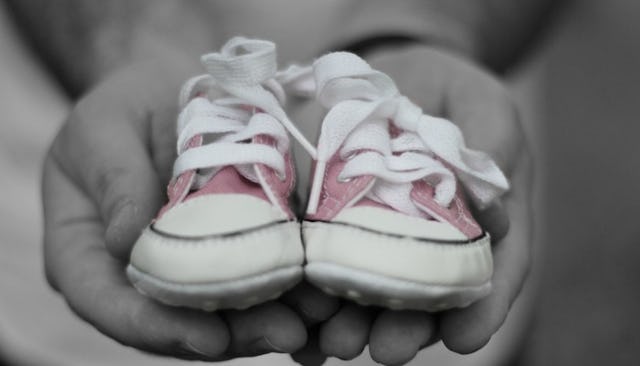Miscarriage Is A Bond Of Pain That Is Born Across All Gender Identities

Though my road to parenthood may be rare, the grief I’ve suffered along the way has been felt universally. Last year, I suffered a miscarriage.
The pregnancy was not planned. No, in fact, it was the furthest possibility from my mind. Artificial testosterone flooded my veins in an effort to transform my “female” body into a “male” one, rendering it more difficult to ovulate.
If my stubborn ovaries did decide to release an unwanted egg, non-hormonal birth control was my insurance against it. The notion of a baby within my womb was so absurd, I had not known I was pregnant until I lost the baby. (It was later confirmed by my endocrinologist.)
I was so confused as I sat in my shower in an attempt to wash away the carnage dripping down my thighs. I didn’t know how to feel.
I had only been married for a month. I still hadn’t finished with my studies. A promotion loomed over my head, just out of reach. It would have been terrible timing for sure, but was that child unloved? For a while, I couldn’t answer that question.
I tried not to think with maternal instinct or heart. I drained my emotions, allowing only my brain to analyze the event.
It was a clump of cells, I told myself. It wasn’t even a baby yet. It felt no pain. It probably had a chromosomal defect.
For about a month, apathy born from my logic saved me from any pain. Then, the shock wore off. The agony came in strong, tsunami-sized waves. In low tide, I could rationalize and function. When it came crashing back in, I was swept into a sea of so many emotions, only to drown.
I was sad. Who would have that child been?
I was scared. Would I be able to have a child in the future?
I was angry. Why me?
I was guilt-ridden. I did this to the baby I was waiting for, didn’t I?
Though most trans men attempt to avoid the feminine art of pregnancy, I always wanted to be a parent. As a gay man, I knew what that entailed. I was just waiting for the right time.
In the meantime, I fantasized about diapers, strollers and an unconditional love I so desperately wanted to give.
With concrete confirmation that a life had been lost, these previously hazy imaginings became all too crystal clear. I had to admit to myself that I lost my baby. I lost the stroller. I lost the diapers. I lost their future.
This admission, however, came with the hope of finally healing, rather than ignoring the festering wound in my soul. I could finally let my tears flow — and so many of them did for so long. Perception of masculinity be damned! Men are allowed to grieve too.
Even now, 27 weeks pregnant with our planned child, I think of the baby I lost. I still weep from time to time, even though it is my personal belief that my son is the same one I lost, returned to me after I was ready for him. I just don’t know for sure; my faith has never been the steadiest, but the notion offers me a comfort I need.
Despite that comfort, I will never be over the loss. In fact, I’m so terrified of it happening again, of losing my precious Luke, it keeps me up at night. I share this fear with so many mothers and fathers.
It is a bond of pain that is born across all gender identities, connecting us in an understanding I wish we didn’t have.
Through this process, I found a community of love and acceptance, because it didn’t matter how I identified.
I was the same as every parent who has felt a loss. I count every kick, every roll, every flutter to ease my mind, just as all parents of losses do. Each moment of life is a blessing felt between us all.
[free_ebook]